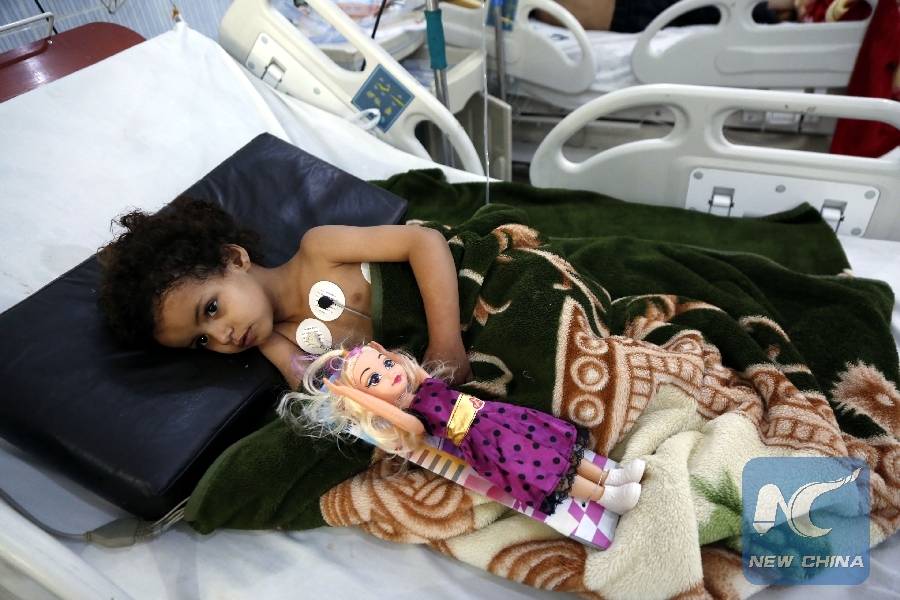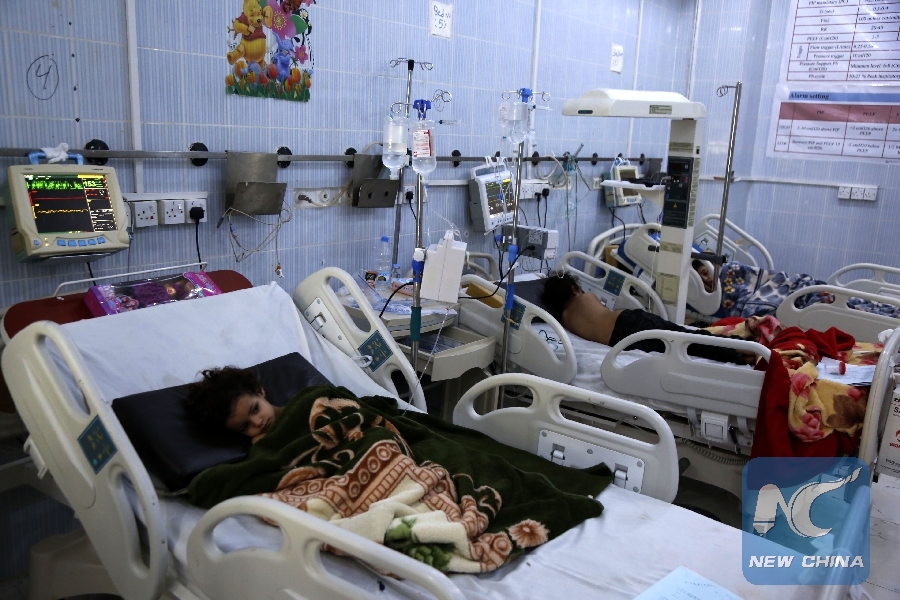 Dua'a, 2 years old, one of Mohammed Saghir Yahya's children who suffered from diphtheria and is treated in al-Sabeen hospital in Sanna on Oct. 20, 2018. (Xinhua/Mohammed Mohammed)
Dua'a, 2 years old, one of Mohammed Saghir Yahya's children who suffered from diphtheria and is treated in al-Sabeen hospital in Sanna on Oct. 20, 2018. (Xinhua/Mohammed Mohammed)
by Mohamed al-Azaki
SANAA, Oct. 20 (Xinhua) -- In a public hospital in downtown Yemen's rebel-held capital Sanaa, doctors are on emergency state over a sudden flare-up of deadly diphtheria.
The intensified care unit is full of sick children and women infected with the disease, a bacterial infection spread from person to person through coughing or sneezing.
The disease causes a thick covering in the back of the throat and the most serious cases can kill a child within hours if not treated immediately.
 Mohammed Saghir Yahya, a father of five who lost two of his children due to diphtheria in al-Sabeen hospital in Sanna. (Xinhua/Mohammed Mohammed)
Mohammed Saghir Yahya, a father of five who lost two of his children due to diphtheria in al-Sabeen hospital in Sanna. (Xinhua/Mohammed Mohammed)
Mohammed Saghir Yahya, a 35-year-old father of five, was weeping his tears just few hours after he buried his two children killed by diphtheria.
"I have rushed my family from the village and arrived here in the hospital two days ago, my youngest child died while we were traveling on the road to the hospital, my second child died on Saturday in the hospital, my wife and my other three children are now in the intensive care unit," Yahya, told Xinhua.
Yahya's sons, Ahmed, 3 years old, and Abdullah, 10 years old, were confirmed dead from diphtheria by the officials of al-Sabeen hospital.
His wife and the other three children were still in critical condition at the hospital, according to doctor Yassir al-Sultan, the deputy head of al-Sabeen hospital's intensive care unit for treating diphtheria.
The father said he sold his small mud-bricks house in Safan village in Haraz district to secure a taxi for transporting his family to the hospital.
Despite that Haraz is part of Sanaa province, the travel from there to the capital Sanaa could take more than 15-hour drive because of the unpaved, ragged, mountainous road as many bridges and paved highway have been destroyed by airstrikes.
These rural districts and villages lack any equipped health centers, which put pregnant women and sick children at high risk.
 Dua'a, 2 years old, one of Mohammed Saghir Yahya's children who suffered from diphtheria and is treated in al-Sabeen hospital in Sanna on Oct. 20, 2018. (Xinhua/Mohammed Mohammed)
Dua'a, 2 years old, one of Mohammed Saghir Yahya's children who suffered from diphtheria and is treated in al-Sabeen hospital in Sanna on Oct. 20, 2018. (Xinhua/Mohammed Mohammed)
Al-Sultan told Xinhua that there are other whole families' members who have been all infected with diphtheria from the northern province of Saada, Red Sea port city of Hodeidah, northwestern province of Hajjah and the central province of Ibb.
"The hospital has received this week up to 64 diphtheria cases, mostly children, 11 of them have died, including the two children of Mohammed Saghir Yahya," Sultan said, stressing that the increasing numbers of diphtheria infections was in just one week.
"I called on all humanitarian aid agencies to help us provide medical supplies to combat the epidemic which apparently begin to spread very fast. Many patients have died because the hospital lacks many types of important medicines to treat critical cases," he said.
"We are unable to save many children's lives after the infection reaches their small hearts," he added.
According to the World Health Organization (WHO), the diphtheria outbreak in Yemen was first reported in October 2017, since when the disease has spread rapidly across the country, infecting more that 1,300 people and killing over 70 until March this year, mostly children.
The Yemeni health authorities in Sanaa said the number of diphtheria infections across the country have since March increased to 2,572, including 1,491 children.
As many as 141 patients have died, including 126 children, according to recent statistics issued by the health authorities in Sanaa this week.
WHO attributes the rapid spread of diphtheria in Yemen to the collapse of the health system, saying "only 50 percent of all health facilities are partially or fully functioning."
In March, WHO and United Nations Children's Fund (UNICEF) launched a large-scale vaccination campaign to control the spread of diphtheria, targeting 2.7 million children aged between 6 weeks and 15 years old in 11 provinces.
The impoverished Arab country has been devastated by deadly war and all-out blockade since March 2015.
The war pits the Yemeni internationally recognized government backed by the Saudi-led coalition against the Iranian-allied Shiite Houthi rebels who forced the government and President Abd-Rabbu Mansour Hadi into exile after they seized control over much of the country's north, including the capital Sanaa.
The war has killed over 10,000 people, mostly civilians, displaced three million others, triggering the world's biggest humanitarian and economic crisis that could put over 25 million population on the brink of famine, according to UN humanitarian agencies.
In addition to the war and economic blockade, the country was also plagued with cholera outbreak, hunger and severe malnutrition.
Since April 2017, the cholera has infected 1.2 million Yemenis, 30 percent of whom are children, and killed 2,515, according to recent data by WHO.

